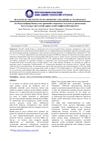 1 citations,
August 2023 in “Composites Part B: Engineering”
1 citations,
August 2023 in “Composites Part B: Engineering” The new wound dressing helps heal burn wounds and regrow hair by releasing beneficial ions.
 August 2024 in “Journal of Cosmetic Dermatology”
August 2024 in “Journal of Cosmetic Dermatology” Telogen effluvium is linked to deficiencies in iron, vitamin B12, and thyroid function.

Zinc levels and lymphocyte counts might be important in heart disease development.
 March 2024 in “Nihon Keshouhin Gijutsushakaishi/Journal of S C C./Nihon Keshouhin Gijutsushakai kaishi”
March 2024 in “Nihon Keshouhin Gijutsushakaishi/Journal of S C C./Nihon Keshouhin Gijutsushakai kaishi” Hair becomes less stiff as we age because of a decrease in zinc, which is linked to lower levels of the protein TG3.
 January 2024 in “The Egyptian Journal of Hospital Medicine (Print)”
January 2024 in “The Egyptian Journal of Hospital Medicine (Print)” Zinc levels are not directly linked to pattern hair loss.
 January 2024 in “International journal of chemical research and development (Print)”
January 2024 in “International journal of chemical research and development (Print)” Low levels of vitamin B12, iron, ferritin, and zinc are linked to hair loss in Iraqi women.
 November 2023 in “Cureus”
November 2023 in “Cureus” Most people in Jazan know about vitamin D, zinc, and ferritin's link to hair loss but don't practice enough preventive measures.
 June 2023 in “Italian journal of dermatology and venereology”
June 2023 in “Italian journal of dermatology and venereology” The oral supplement improved hair loss in patients with telogen effluvium.
 April 2023 in “Acta Poloniae Pharmaceutica”
April 2023 in “Acta Poloniae Pharmaceutica” Herbal extract shampoo increased certain minerals in hair and improved hair growth and scalp health.
 March 2023 in “World Journal of Biology Pharmacy and Health Sciences”
March 2023 in “World Journal of Biology Pharmacy and Health Sciences” Low levels of zinc and ferritin may be linked to the severity of alopecia areata in Iraqi patients.
 February 2023 in “Benha Journal of Applied Sciences”
February 2023 in “Benha Journal of Applied Sciences” People with Telogen Effluvium have similar zinc levels in their blood as healthy individuals.
 January 2023 in “Postepy Dermatologii I Alergologii”
January 2023 in “Postepy Dermatologii I Alergologii” Zinc is important for health and its supplementation may help treat various conditions.
 December 2022 in “Himi, himijn tehnologijn hùrèèlèngijn èrdèm šinžilgèènij bùtèèl”
December 2022 in “Himi, himijn tehnologijn hùrèèlèngijn èrdèm šinžilgèènij bùtèèl” Hair products with copper and zinc enriched yeast made hair thicker and denser.
 August 2022 in “International Journal of Health Sciences (IJHS)”
August 2022 in “International Journal of Health Sciences (IJHS)” Low levels of zinc, ferritin, and vitamin B12 are linked to severe hair loss in pregnant women during their last two trimesters.
 July 2022 in “Dermatology Reports”
July 2022 in “Dermatology Reports” Low zinc levels might be linked to worse outcomes in various skin disorders.
 July 2022 in “Al-Mağallaẗ al-ʻirāqiyyaẗ li-l-ṣaydalaẗ”
July 2022 in “Al-Mağallaẗ al-ʻirāqiyyaẗ li-l-ṣaydalaẗ” People with Alopecia Areata often have lower zinc levels, and more hair loss is linked to even lower zinc levels.
 January 2022 in “United Research Forum eBooks”
January 2022 in “United Research Forum eBooks” Picky eating in children is linked to lower zinc levels and various nutritional deficiencies.
February 2021 in “INTERNATIONAL JOURNAL OF SCIENTIFIC RESEARCH” Low zinc and copper levels may indicate Telogen Effluvium.
 September 2020 in “Benha Journal of Applied Sciences”
September 2020 in “Benha Journal of Applied Sciences” Patients with Alopecia Areata have lower levels of zinc and biotin than healthy individuals.
January 2019 in “Türkiye klinikleri dermatoloji dergisi” Low levels of iron, ferritin, zinc, and folic acid may contribute to hair loss in women.
The levels of zinc, vitamin D, ferritin, and selenium are different in people with androgenic alopecia compared to a control group.
 March 2014 in “Journal of The American Academy of Dermatology”
March 2014 in “Journal of The American Academy of Dermatology” Vitamin D deficiency is common in temporary hair loss, and stress is often a suspected cause.
 January 2013 in “kerbala journal of pharmaceutical sciences”
January 2013 in “kerbala journal of pharmaceutical sciences” Low zinc levels are strongly linked to hair loss in adult premenopausal women.
Adding zinc to papaya extract speeds up wound healing.
August 2024 in “Jordan Medical Journal” Picky eating in children is linked to lower weight, hemoglobin, vitamin D, and zinc levels.

Iron supplements improved hemoglobin levels and combined iron and zinc reduced measles risk in Indonesian infants.
 January 2024 in “Australasian journal of dermatology (Print)”
January 2024 in “Australasian journal of dermatology (Print)” A boy's hair turned red because of genetic mutations, not lack of zinc.
 January 2024 in “Biochemical and Biophysical Research Communications”
January 2024 in “Biochemical and Biophysical Research Communications” Lack of zinc can cause hearing loss by damaging important parts of inner ear cells in mice.
 December 2023 in “Benha Journal of Applied Sciences”
December 2023 in “Benha Journal of Applied Sciences” Men with male pattern baldness have higher blood sugar, bad cholesterol, and ZAG protein levels than healthy men.
 November 2023 in “Journal of Basic Microbiology”
November 2023 in “Journal of Basic Microbiology” Green-synthesized zinc oxide nanoparticles effectively inhibit common fungi found on human scalp hair.

























